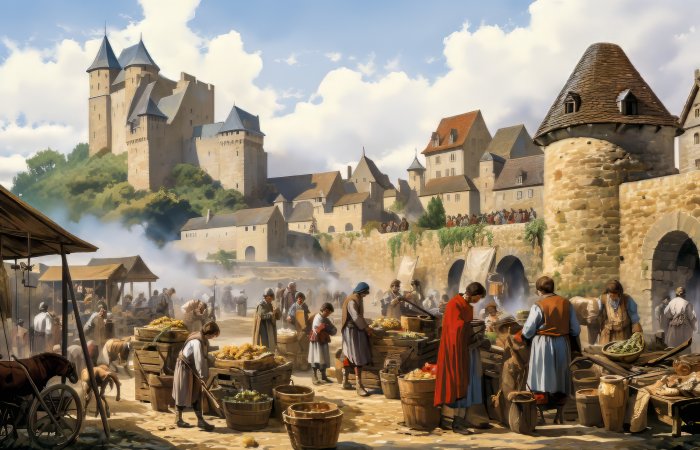Conny Waters – AncientPages.com – Visiting a market within the Center Ages might be a nice expertise. Nevertheless, honesty was essential as a result of practices reminiscent of fraud and theft have been topic to harsh punishment.
In Medieval England marketplaces England, markets sometimes befell weekly.
Credit score: Adobe Stock – lutjo1953
These marketplaces have been glorious alternatives for purchasing and promoting items and in addition functioned as social hubs the place folks may work together with one another.
Medieval Practices Of Slicing Cash In Items
It was widespread information there have been particular buying and selling guidelines which everybody needed to observe.
“Coin was more and more vital within the rising market financial system of late medieval England and to make sure confidence on this medium of change the sovereign tried to exert management.” 1
Dishonest with gold, silver or producing falsified cash have been critical crimes. “Within the tenth century, Aethelstan (929–39) was the primary to declare that there ought to be one coinage in his realm and that cash ought to be minted solely within the cities ascribed. The penalty for base moneyers who produced gentle cash was for them to have their hand reduce off and displayed on the mint.” 1
Up to now, small merchants didn’t essentially require a complete coin for his or her transactions. As an alternative, cash have been typically divided into smaller segments, which have been then utilized for a number of funds, diminishing their sensible worth.
Everybody May Be Punished
All cheaters, whether or not male or feminine, have been punished. In England, moneylenders who imposed exorbitantly high-interest charges have been subjected to public humiliation. They have been sure to a chair and paraded across the market city. The mode of transportation used for this goal was sometimes an open wagon, generally utilized for carrying manure.
In Italian cities with slender streets and little area, it was forbidden to throw meat on the bottom.
In Florence, the butchers maintained cleanliness of their promoting areas, guaranteeing no rotten stays have been left behind. Nevertheless, because of the worth of meat scraps and different waste supplies, cities would public sale the cleansing rights of those squares. The best bidder would then acquire these waste supplies for resale.
The success of a market additionally closely relied on whether or not native authorities may implement regulation and order. For example, in Leicester, England, people who brought on disturbances by drawing their swords inside the market’s neighborhood confronted stricter penalties than ordinary. In different places, guests have been prohibited from bringing weapons by means of metropolis gates to keep up peace and order.
Unlawful Marketplaces
“A few of these rural markets have been related to church buildings. In 1488, unlawful markets held on the Cistercian nunnery of Skokloster and at a church referred to as Ness have been ordered to shut. Christian church buildings that had changed pagan cult centres continued to supply alternatives for purchasing and promoting, though there’s little direct proof of Sunday buying and selling in Scandinavia as there’s in England.
Swedish market charters starting within the late thirteenth century are involved solely with weekday markets (Ku/turhistorisk Leksikon, xviii, col. 480), however the thirteenth century regulation of Gotland offered for the sale on Sundays of cheese, butter, fish, fowls and meat, however not 4, seeds or different items. In1531 Gustav Vasa complained that unlawful festivals have been changing into so frequent that there would quickly be one held at each church competition.” 1
Value Controls
There have been limits on how a lot a Medieval vendor may demand for a product. To handle worth fluctuations on primary merchandise, a worth cap was applied on objects like bread, wine, and beer.
Medieval market. Credit score: Public Domain
The value ceiling would make sure that even the bottom lessons of society may afford meals, thus stopping rise up. “Most costs of meat have been often set in quite a lot of particular person boroughs, maybe drawing on statutory precedent, and confirmed how native price-fixing was generally tolerated.” 1
In England, the pricing of important merchandise was decided by the King. He appointed two worth controllers in each metropolis all through the dominion. Their duty was to observe marketplaces for fraudulent actions. If they found anybody trying to cost greater than the permitted worth, punitive measures, together with fines, have been taken.
Within the medieval market, the principles have been common, making use of to each sellers and patrons alike.
Written by Conny Waters – AncientPages.com Workers Author
Copyright © AncientPages.com All rights reserved. This materials might not be printed, broadcast, rewritten or redistributed in entire or half with out the specific written permission of AncientPages.com
Increase for references
- James Davis – Medieval Market Morality: Life, Law and Ethics in the English Marketplace, 1200–1500
- Tim Pestell, Katharina Ulmschneider – Markets in Early Medieval Europe: Trading and ‘Productive’ Sites, 650-850
- Dennis Romano – Markets and Marketplaces in Medieval Italy, C. 1100 to C. 1440

